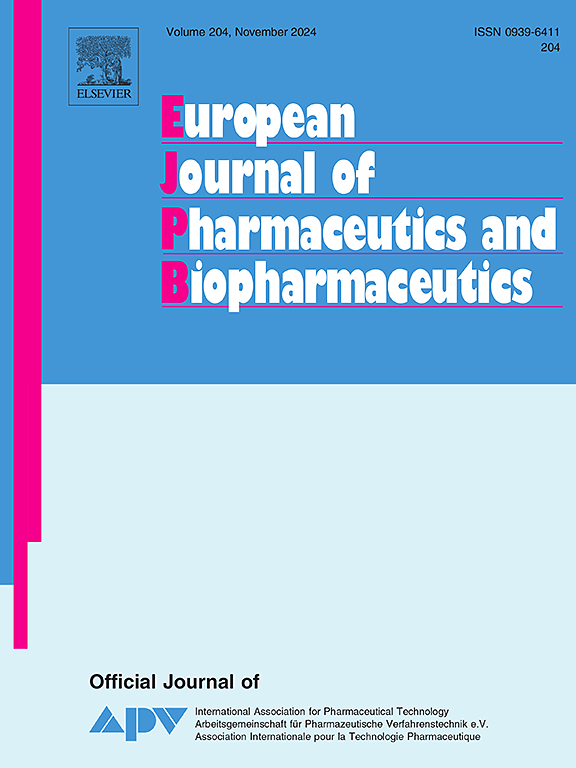Starch-Based scaffold produced by FDM 3D printing technique as Innovative and biosustainable wound dressing
IF 4.4
2区 医学
Q1 PHARMACOLOGY & PHARMACY
European Journal of Pharmaceutics and Biopharmaceutics
Pub Date : 2025-03-20
DOI:10.1016/j.ejpb.2025.114698
引用次数: 0
Abstract
Starch is a safe biopolymer, whose use for the production of scaffolds intended for deep wounds treatment is limited, due to its low mechanical and thermal properties. For this reason, until now, it has been used in low amounts and/or in combination with other biopolymers. The aim of the study was to produce thermoplastic filaments (TPS) with high starch content, useful for scaffolds production by Fusion Deposition Modelling 3D printing technique. TPS was obtained by hot melt extrusion from a mixture of starch (70 % w/w) and glycerol (30 % w/w) combined to cationic clay montmorillonite, citric acid and magnesium stearate to improve strength and processability. The prepared scaffold was characterized and compared to other two scaffolds, where the effect of the addition of polycaprolactone (PCL) or methylsulphonylmethane (MSM) (as thermostable model drug) to the blend was evaluated. The mechanical properties were investigated by Brillouin Light Scattering. In vitro studies highlighted that the scaffolds are: i) able to absorb simulated exudates (reaching a hydration of 35 % in 7 days); ii) safe on keratinocytes (viability > 70 %) stimulating their growth; iii) able to inhibit S. pyogenes growth.

FDM 3D打印技术生产的淀粉基支架,创新的生物可持续伤口敷料
淀粉是一种安全的生物聚合物,由于其较低的机械和热性能,其用于生产用于深度伤口治疗的支架的用途受到限制。由于这个原因,到目前为止,它一直以低剂量和/或与其他生物聚合物结合使用。该研究的目的是通过熔融沉积建模3D打印技术生产高淀粉含量的热塑性细丝(TPS),用于支架的生产。将淀粉(70% w/w)和甘油(30% w/w)与阳离子粘土蒙脱土、柠檬酸和硬脂酸镁混合,通过热熔挤压得到TPS,以提高其强度和加工性。对所制备的支架进行了表征,并与其他两种支架进行了比较,其中评估了在混合物中加入聚己内酯(PCL)或甲基磺酰甲烷(MSM)(作为耐热模型药物)的效果。用布里渊光散射法研究了材料的力学性能。体外研究强调,支架是:i)能够吸收模拟渗出液(在7天内达到35%的水化);Ii)对角质形成细胞安全(生存能力>;70%)刺激他们的成长;iii)能够抑制化脓性葡萄球菌生长。
本文章由计算机程序翻译,如有差异,请以英文原文为准。
求助全文
约1分钟内获得全文
求助全文
来源期刊
CiteScore
8.80
自引率
4.10%
发文量
211
审稿时长
36 days
期刊介绍:
The European Journal of Pharmaceutics and Biopharmaceutics provides a medium for the publication of novel, innovative and hypothesis-driven research from the areas of Pharmaceutics and Biopharmaceutics.
Topics covered include for example:
Design and development of drug delivery systems for pharmaceuticals and biopharmaceuticals (small molecules, proteins, nucleic acids)
Aspects of manufacturing process design
Biomedical aspects of drug product design
Strategies and formulations for controlled drug transport across biological barriers
Physicochemical aspects of drug product development
Novel excipients for drug product design
Drug delivery and controlled release systems for systemic and local applications
Nanomaterials for therapeutic and diagnostic purposes
Advanced therapy medicinal products
Medical devices supporting a distinct pharmacological effect.

 求助内容:
求助内容: 应助结果提醒方式:
应助结果提醒方式:


